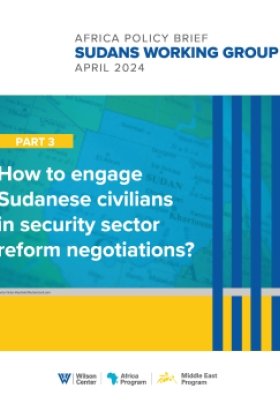A Plan to Deal with Iran
U.S. policy towards Iran is one of the most contentious foreign policy issues today. Former Congressman Lee Hamilton discusses the options for dealing with Tehran.
Our major objective in the present dispute with Iran is singular and clear: Prevent it from developing nuclear weapons.
There are three broad policy options: acquiescence, military action and negotiation.
We could accept a nuclear Iran. But it is not in America's, the Middle East's, or the world's interest to tolerate further nuclear proliferation.
We could attack Iran, with a limited strike on their nuclear facilities or a "shock-and-awe" type operation seeking regime change.
But intelligence estimates on Iran's proximity to the bomb vary from two to eight years, so we have time to pursue non-military ventures. A limited attack would likely miss secret or underground bases, not to mention the retaliation it would inspire against U.S. troops and interests in Iraq, the oil-rich Gulf and elsewhere. In the end, we cannot obliterate Iranian nuclear knowledge with a bomb.
As for regime change, we have our hands full already in Iraq and Afghanistan. And advocates leave some key questions unanswered: Would regime change achieve our non-proliferation goals? What specific steps are we prepared to take and what sacrifices are we willing to make in pursuit of deposing the mullahs?
That leaves negotiation, which emphasizes changing certain Iranian policies, not the regime itself. This is the most promising but most complex policy, full of potential pitfalls.
Currently, we are sending mixed messages that obfuscate our objectives and intentions vis-à-vis the Iranians. We engage them in discussions over Iraq, but simultaneously deploy a second carrier battleship group off Iran's coast. We have toned down combative rhetoric but have allocated $75 million to democracy promotion in Iran, a move Iranians see as an attempt at subversion.
Diplomacy requires a degree of strategic flexibility for all parties.
Several commentators have called for a "grand bargain," in which Tehran and Washington would resolve all outstanding disputes -- and there are plenty dating back over 50 years -- including the nuclear issue. But a grand bargain sets the bar too high. Our ultimate goal should include normalizing relations with an Iran committed to peace and stability, but for the time being preventing nuclear proliferation must take precedence.
My preferred course of action combines credible sanctions and incentives with containment. We engaged Iran after Sept. 11 through the U.N.-sponsored forum on Afghanistan in Geneva, when we shared enemies in both the Sunni-extremist Taliban and Al-Qaida. Granted, conditions in our relationship have deteriorated, but there are opportunities for cooperation which should be pursued, though success is far from guaranteed.
It is hard to see a solution to Iraq's problems, progress in dealing with Lebanon's internal political conflict, or stability in Afghanistan without Iran's participation. Iran is in a position of leverage across the region and can block developments it does not favor.
One key to successfully engaging Iran may be offering carefully calibrated incentives, and we have plenty to offer. Despite its vast oil and gas resources, Iran desperately needs foreign investment and infrastructure development. Trade agreements leading to World Trade Organization membership could help salvage a struggling economy.
Robust and vigorous diplomacy could also help mobilize the international community -- crucially veto-wielding China and Russia -- to stand with us in enforcing sanctions painful enough to prompt changes in Iranian policy.
We must always remind Iran of the benefits of engagement and the costs of isolation. We should work for stronger, tougher sanctions and intrusive inspections without delay. Military action can remain our big stick while we speak a bit more softly.
There are few countries in the Middle East, or the world for that matter, that have caused us more heartburn over three decades than Iran. But if Iran and the U.S. are willing to negotiate seriously for a sustained period, what is difficult to imagine today could become possible tomorrow: a U.S.-Iran relationship grounded in a measure of mutual respect and elements of cooperation to meet our common interests, specifically preventing chaos in Iraq and denying the Taliban power in Afghanistan.









